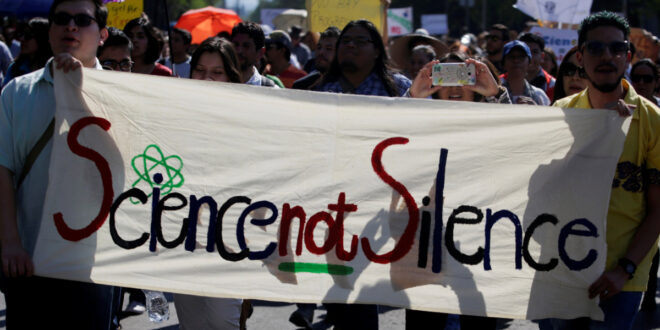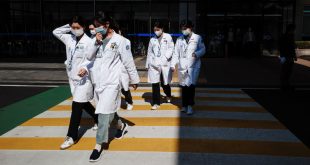It is, of course, too early to declare victory.
Defeating COVID-19 remains elusive and, sadly, beyond the distant horizon. While some nations are making important headway against this stubborn, mutating virus, other parts of the globe remain ravaged by a clandestine contagion that has already infected and killed millions and will infect and kill countless others until this sinister menace hopefully fades into irrelevance.
Still, undeniable progress has been made in staunching the halting human toll of a virulent pathogen that has, for more than a year, paralysed much of the world and compelled many of us to ponder nature’s unpredictability and our fragile mortality.
Leading the way in realising humanity’s salvation has been what I have previously dubbed the “white-coat army” of scientists and physicians who have helped navigate the planet and our tender psyches through these distressing and turbulent times.
Unperturbed by the kooks, quacks and dangerous political hacks, the white-coat army has gone about their necessary, deliberate, empirical work to engineer vaccines that inoculate us from the lethal consequences of an indiscriminate virus that has caused such lasting pain, suffering and loss.
Save for the kooks, quacks and dangerous political hacks, a largely relieved and grateful world has responded with this simple, yet powerful admission: In science we trust.
The prospect of a sudden or lengthy, lonely death has, understandably, seized our collective consciousness. Most of us have heeded the learned advice of the white-coat army to change, if possible, how we live and work, not only to protect ourselves, but family we love and strangers we will never know.
If there was doubt about the often fatal folly of not following their instructions, word that almost all the deaths lately of patients battling COVID-19 in the United States have been the result of either delaying or refusing to be vaccinated, is a bitter, blunt rebuttal to the kooks, quacks and hacks who traffic in lunatic superstitions and a stupefying ignorance that defies explanation or comprehension.
If and when the world can celebrate victory, it will be, in large measure, because sentient citizens acknowledged the intractable doom we would have faced if stupidity, greed, and selfishness had trumped knowledge, sacrifice and pursuit of the common good.
As some of us tentatively emerge from the tedium and uncertainty borne of lockdowns, we know that sacrifice, knowledge and the pursuit of the common good were required to confront the existential threat posed by a new and tenacious virus.
We proved it could be done, when it needed to be done.
Now, we are required to adopt the same conviction and resolve to confront finally and emphatically the existential threat posed by the old and accelerating threat of climate change.
Otherwise, the hard, costly struggle to defeat COVID-19 ultimately will be a brief, pyrrhic success and the not-so-distant future repercussions of our failure to act will render the jarring disorientation, absences and losses we have endured over the last 16 months picayune in comparison.
Despite what the kooks, quacks and dangerous political hacks say, this is what the established science tells us will happen soon if we do not change the way we live, work and behave in a fundamental, comprehensive way: The Earth may become uninhabitable.
The grim alarm was raised again last week by an AFP report on a draft copy of a voluminous study being prepared by the United Nation’s Intergovernmental Panel on Climate Change (IPCC) that is slated to be made public in early 2022.
Unsurprisingly, the draft report’s dire prophesy failed to pierce the near blanket preoccupation among TV and newspaper editors with other, more frivolous, news.
In any event, the 4,000-page draft report’s central findings make clear that the time to “worry” over the ruinous, irreversible effects of climate change was over long ago. It is time to adopt a more appropriate attitude to the unfolding and impending damage that will be exacted on Earth if we continue to delay, dither and deny: Panic.
If you are inclined to dismiss this admonition as irresponsible hyperbole, then consider how, according to the IPCC’s draft report, the impact of climate change will, within a few decades, register permanently on a planet that today is on terrestrial life-support.
Vital ecosystems hanging on the precipice will collapse. The precipitous rise in temperatures will make large swaths of the Earth unliveable. Chronic hunger, disease and poverty will become the norm for hundreds of millions more souls. Scores of coastal cities will be subsumed by rising sea levels. Drought and untameable fires will spread. Species extinction will quicken.
“The worst is yet to come, affecting our children’s and grandchildren’s lives much more than our own,” the draft report says.
The Earth will adapt. But we will be, by our shared negligence, gluttony and procrastination, the architects of our own demise.
“Life on Earth can recover from a drastic climate shift by evolving into new species and creating new ecosystems,” the draft report adds. “Humans cannot.”
While one of the report’s authors cautioned that the draft seen by the AFP will be revised and sections may be added, the overarching conclusions have an all too familiar and ominous ring.
Indeed, in a prescient address at the World Economic Forum in Davos, Switzerland in 2019, the indomitable teenage climate activist, Greta Thunberg, issued an urgent warning and candid call to action using frank, unembroidered language.
“Our house is on fire,” Thunberg said. “I don’t want you to be hopeful. I want you to panic. I want you to feel the fear I feel every day. Then, I want you to act. I want you to act as you would in a crisis. I want you to act as if the house was on fire because it is.”
While Thunberg’s remarks predate the emergence of the pandemic, she understood intuitively the imperative to address the dangers posed by climate change with the same urgency and fidelity to science that the witting world has responded to the dangers posed by a virus.
And Thunberg’s prescriptions to avoid calamity mirror the draft report’s prescriptions to avoid calamity: Only transformational change can save us from our burning house.
“We need transformational change operating on processes and behaviours at all levels: individual, communities, business, institutions and governments,” it says. “We must redefine our way of life and consumption.”
So, we have to listen once more to the white-coat army who shepherded us out of the COVID-19 abyss, and have, for generations, told us what we need to do to avert another, looming abyss.
In science we must trust – again.
The views expressed in this article are the author’s own and do not necessarily reflect Al Jazeera’s editorial stance.
 Top Naija News – daily news updates in Nigeria | breaking news naija Welcome to Top Naija News, your ultimate destination for daily news updates in Nigeria. We are a dedicated news curation blog from various sources.
Top Naija News – daily news updates in Nigeria | breaking news naija Welcome to Top Naija News, your ultimate destination for daily news updates in Nigeria. We are a dedicated news curation blog from various sources.




